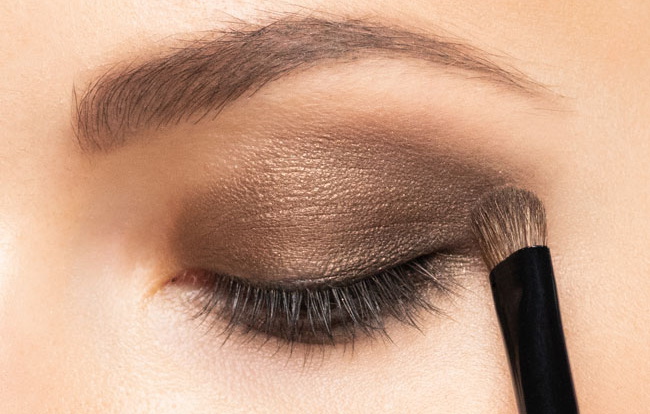Harmful Makeup Ingredients You Should Avoid (And Why)

Not to sound too dramatic, but if you're using makeup, you might want to go check your products right after you finish reading this article because there's a high chance they're harming your health.
Traditional makeup (even the expensive kind!) often has toxic chemicals in the ingredient list, and those chemicals cause all sorts of trouble.
From issues like skin irritations and dryness to hormonal imbalance and even cancer, we quickly start seeing the benign-looking lipstick or foundation in a whole new light!
Want to make a change but not sure how and where to start? Here are 10 harmful makeup ingredients you should avoid and the best organic makeup alternatives.
Bad chemicals vs. good chemicals
First, we'd like to address the elephant in the room - the fact that not all chemicals are harmful. It's easy to get confused as the phrase chemical-free is often overused or offered without explanation.
Our world is made of chemicals, from the food we eat to the flowers we smell on a sunny day to the air we breathe 24/7. On the other hand, some toxic chemicals can be natural too, e.g. the rash-inducing poison ivy's urushiol.
Nothing is actually chemical-free, and when you see the phrase on organic makeup products, it implies they're toxic-chemical free.
So whenever you're browsing the beauty aisle at the drugstore, make sure you not only look for the "chemical-free" sign but actually read the label as it's the only place you'll find all the information and make the best decision for your health.
Toxic chemicals to avoid
Some government regulations limit the use of toxic chemicals in makeup, but unfortunately, they're not rigorous enough, and part of that burden falls on the consumer (yes, us).
So even if that complicates your life, if you want to be sure you're doing the best for your health, always read the labels of your lipstick, mascara and other beauty products.
You can even save the list of toxic chemicals to avoid below to your phone and always have it handy!
- * Parabens (e.g. Propylparaben, Methylparaben, Isobutylparaben)
- * Polyethylene (PEGs)
- * Butylated hydroxyanisole (BHA)
- * Phthalates
- * Fragrance
- * Chemical UV filters Octinoxate and Oxybenzone
- * Diethanolamine (DEA)
- * Triclosan
- * Sodium Laureth sulphate (SLS)
- * Formaldehyde
- * PFAS (chemicals that include PFOA, PFOS, GenX etc.)
Let's look closer at a few of the most common ones.
Parabens are chemicals often used as preservatives in various cosmetic products to extend their shelf life. Unfortunately, parabens can cause skin irritation, endocrine disruption, reproductive harm and even cancer.
Phthalates are commonly used in products such as nail polish to make them last longer; however, some studies have indicated that they may cause hormonal balance, reproductive, developmental and other health issues.
PFAS or per- and polyfluoroalkyl substances are used in beauty products such as lipsticks or mascaras to increase their durability, spreadability, and wear. These are incredibly common, and that's why it's even scarier that a recent study has linked PFAS exposure to cancer, damage to the immune system, and reproductive harm.
Formaldehyde is used to prolong shelf life and prevent bacterial contamination in beauty products, but it can cause irritant contact dermatitis and severe skin allergies.
The makeup trifecta
Lipstick, lip gloss, mascara, eyeliner, eyeshadow, foundation, blush, bronzer, compact powder, primers, even if you don't use everything from the list, you most likely have the makeup trifecta. We're talking lipstick, mascara and foundation.
Unfortunately, using only these 3 products that contain toxic ingredients is enough to cause harm.
Lipstick. Beautiful, bright lips? Yes! Parabens linked to cancer, irritations and allergic reactions? No, thank you!
Mascara. We all have a favourite brand, but let's make sure it doesn't include parabens that might disrupt hormone function, fertility issues or carbon black, which has been linked to lung tumours.
Foundation. This product covers the entire face! And even so, it often contains such chemicals as methylparaben, propylparaben, and glycol that might affect the endocrine system.
Switch to natural skincare and organic makeup
Yes, this information does sound a little scary, but the good thing is that the alternatives are now more accessible than ever!
So how to make the best choice when choosing natural skincare and organic makeup? While packaging with phrases "clean", "chemical-free", or "non-toxic" can be helpful, don't forget to double-check the claims. That's where the no-no list of toxic chemicals to avoid comes in handy. Ingredients don't lie!
If it feels too time-consuming or overwhelming to check every single product on the shelf, do some research online, you'll find great brands that proudly list their clean ingredients and certifications front and centre for you to see. Choosing smaller clean beauty brands and their organic makeup and natural skincare products is not only great for your health, but it also supports small businesses!
Lastly, when you find a brand or product you love but still have, e.g. some old mascara left, don't rush to toss it away! Use up the old one and only then replace it. Swapping out the whole makeup bag at once is unnecessary and pricey!
Mineral makeup
When it comes to beauty products, one of the best clean organic makeup choices is mineral makeup, which includes powder, blush, bronzer, concealers, correctors, and foundation.
Many clean beauty brands such as SCOUT Organic Active Beauty offer clean, vegan, certified organic mineral chemical-free mineral makeup that's sustainably sourced.
These products are gentle, non-irritating, have none of the previously mentioned side effects and look just as good (if not better!) than traditional makeup!
In conclusion, yes, traditional makeup is often harmful, but it's up to you to make a better beauty choice!










